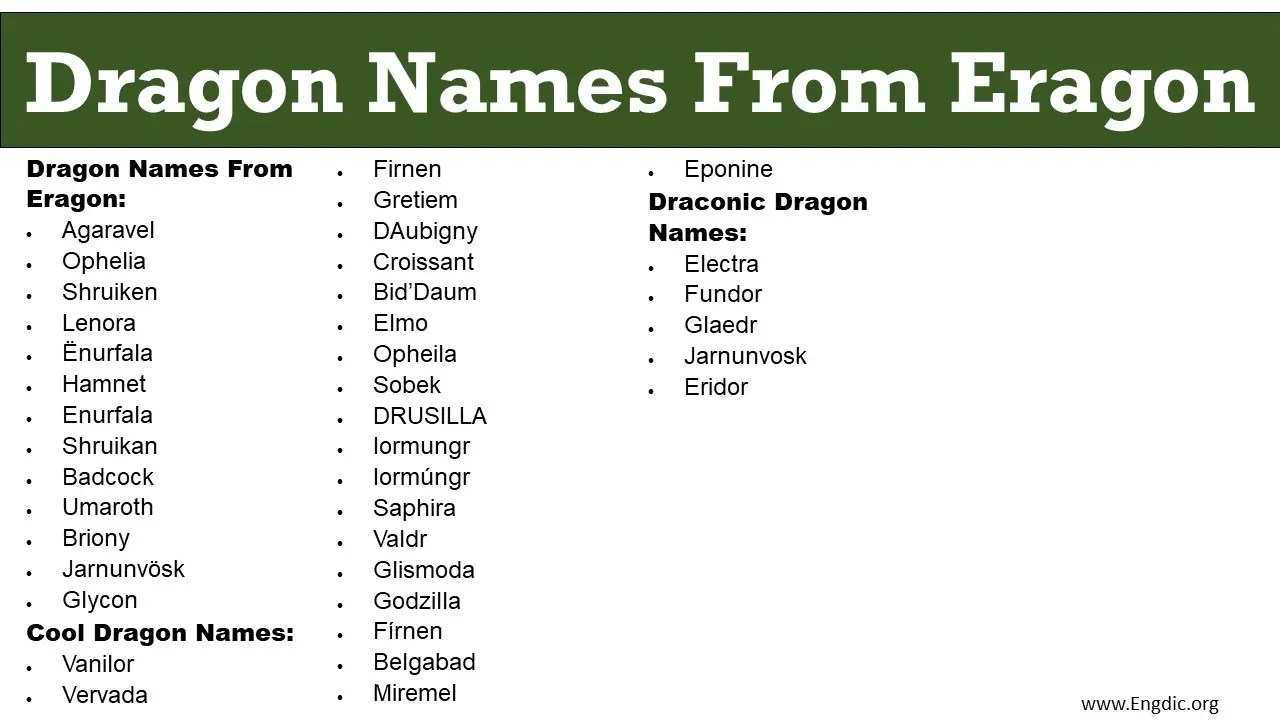Dragons have long captured the imagination of people around the world, becoming synonymous with power, mystery, and magic. In various cultures, these mythical creatures represent more than just fearsome beasts; they embody wisdom, strength, and sometimes even benevolence. In this article, we will delve into the fascinating world of dragon mythology, exploring some of the most famous names of dragons across different cultures and their significance. From the fire-breathing dragons of Western folklore to the wise and noble dragons of Eastern legends, each has its own unique story and characteristics.
We will also provide a comprehensive overview of the characteristics that define these legendary creatures, as well as their roles in literature, film, and popular culture. By understanding the famous names of dragons, you will gain insight into the cultural significance of these creatures and how they continue to influence modern storytelling.
This article will serve as your ultimate guide to the famous names of dragons, showcasing their history, characteristics, and the roles they play in various narratives. So, whether you are a fantasy enthusiast, a literature lover, or simply curious about these mythical beings, join us on this journey through the realms of dragons.
Table of Contents
- 1. The Origins of Dragon Mythology
- 2. Famous Dragons in Western Culture
- 3. Notable Dragons in Eastern Myths
- 4. Dragons in Literature and Film
- 5. Characteristics of Famous Dragons
- 6. The Symbolism of Dragons
- 7. The Future of Dragons in Popular Culture
- 8. Conclusion
1. The Origins of Dragon Mythology
The concept of dragons can be traced back to ancient civilizations, where they were often depicted as powerful and fearsome beings. In many cultures, dragons symbolized chaos, destruction, and untamed nature. Archaeological findings suggest that the dragon myth may have originated from the discovery of large dinosaur fossils, which ancient people could not explain.
In early Mesopotamian cultures, dragons were often associated with storms and were seen as divine protectors. For example, the Babylonian dragon Tiamat was a primordial goddess who represented the saltwater ocean and chaos. Similarly, in ancient China, dragons were revered as symbols of power and good fortune.
2. Famous Dragons in Western Culture
Western mythology is rich with famous dragons, often portrayed as antagonists in various tales. Here are some notable examples:
2.1. Smaug
One of the most famous dragons in literature, Smaug is the primary antagonist in J.R.R. Tolkien's "The Hobbit." This fire-breathing dragon is known for his cunning intelligence and greed, hoarding treasures within the Lonely Mountain.
2.2. Drogon
Drogon, one of the three dragons in the television series "Game of Thrones," is named after Daenerys Targaryen's late husband. He is known for his fierce loyalty and immense power, representing the Targaryen legacy.
2.3. Fafnir
In Norse mythology, Fafnir was originally a dwarf who transformed into a dragon due to his greed for gold. His story emphasizes the dangers of avarice and has been adapted into various literary works.
3. Notable Dragons in Eastern Myths
Eastern cultures view dragons quite differently, often depicting them as benevolent and wise. Here are a few famous dragons from Eastern mythology:
3.1. Shenlong
In Chinese mythology, Shenlong is a dragon who controls the weather and is associated with agriculture. He is revered as a bringer of rain and prosperity.
3.2. Yamata no Orochi
A legendary eight-headed dragon from Japanese mythology, Yamata no Orochi was defeated by the hero Susanoo. This tale symbolizes the triumph of good over evil.
4. Dragons in Literature and Film
Dragons have made a significant impact on literature and film, often serving as symbols of power, fear, or wisdom. Popular literature and films include:
- "The Hobbit" by J.R.R. Tolkien
- "How to Train Your Dragon" by Cressida Cowell
- "Dragonheart" directed by Rob Cohen
5. Characteristics of Famous Dragons
Famous dragons often share certain characteristics that define their roles in mythology and storytelling:
- Fire-breathing abilities
- Immense size and strength
- Intelligence and cunning
- Guardians of treasure or wisdom
- Symbolic representations of chaos or order
6. The Symbolism of Dragons
Dragons symbolize various concepts across cultures:
- In Western cultures, dragons often represent evil, greed, and chaos.
- In Eastern cultures, they signify power, good fortune, and wisdom.
- Dragons can also embody the duality of nature, representing both destructive and protective qualities.
7. The Future of Dragons in Popular Culture
As fantasy genres continue to evolve, dragons remain a staple in modern storytelling. With advancements in technology and storytelling techniques, dragons are likely to take on new forms and continue to captivate audiences worldwide.
8. Conclusion
In conclusion, the famous names of dragons reflect their rich history and cultural significance. From Smaug to Shenlong, these legendary creatures continue to inspire and fascinate us through literature, film, and folklore. As we move forward, the legacy of dragons will likely endure, reminding us of the powerful stories that shape our understanding of the world.
We invite you to share your thoughts on this article. What are your favorite dragon stories? Leave a comment below and explore more fascinating topics on our site!
Thank you for joining us on this exploration of the famous names of dragons. We hope to see you again soon for more intriguing content!
Niall Horan's Wife: A Deep Dive Into His Personal Life
Good Morning Text For Her: How To Make Her Day Brighter
Grey's Anatomy: When Does Derek Die?


